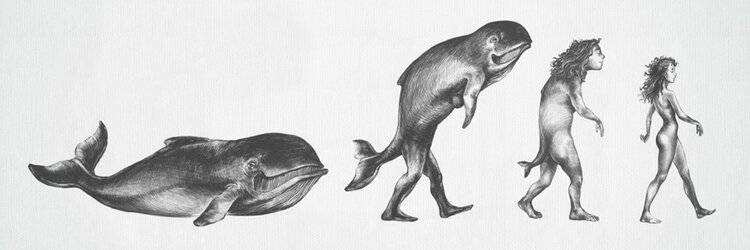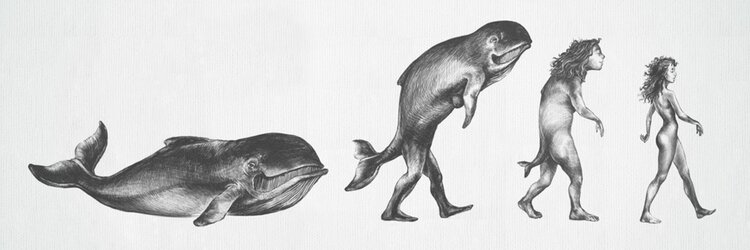
5 Answers
Leave a Reply
You must Register - Login to add an answer.
5 Answers
Apes exist precisely because evolution exists. Thanks to her, primates have become one of the most progressive groups. It allowed primates to adapt perfectly to the environment, and also made them very smart.
And if you mean why man didn't replace them all, it's because they are not our competitors and none of them are our ancestors. Our last common ancestor, the proconsul, lived about 17 million years ago.
Because Homo Sapiens is not descended from a gorilla, a chimpanzee, or an orangutan. We have a common ancestor – the proconsul, but then, so to speak, “our paths diverged.” Our communication with monkeys is not sequential, but parallel. We developed in different ways, almost without intersecting. Our path was much more advantageous, we are now the dominant species.
If we had started competing with them at any stage of development, it would have been either us or them right now, but this did not happen, and most likely will not happen again.
I don't see any contradiction at all. Monkeys have evolved and are still evolving. And while they are not going to die out. This is a rather promising group in general. Perhaps the most numerous type of infra – squad is the homo sapiens. And there are also numerous species of macaques and others. Of course, no one is immune from extinction, but so far there are no groups that could quickly displace all the monkeys.
Why shouldn't they be? Human evolution does not involve the transformation of currently existing apes into humans. The current apes, humans, and every other animal are the same crown of evolution, its (so far) final point. Man is not descended from the present-day apes, but has common ancestors with them. So we're cousins of chimpanzees. Once, after millions of years, and maybe more, existing species may evolve into something that will no longer be possible to call them by their current names. Evolution is not only as old as our planet itself, but even as old as our universe. This is the basis of all life on our planet. Everything that you can observe in nature can be explained by one or another evolutionary mechanism.
Because the replacement of one species by another occurs only if the species directly compete, and one is stronger than the other. Roughly speaking, a human is an open-area monkey. Our ancestors stood up on their hind legs to walk and run on the ground. And there they competed with each other, until we, the current people, pushed them all out. And other monkeys lived in dense forests and jungles all this time. And in terms of evolution, we did not compete with them. Therefore, we began to displace them only after the development of civilization, when we began to cut down forests.
Leave a Reply
You must Register - Login to add an answer.

Apes exist precisely because evolution exists. Thanks to her, primates have become one of the most progressive groups. It allowed primates to adapt perfectly to the environment, and also made them very smart.
And if you mean why man didn't replace them all, it's because they are not our competitors and none of them are our ancestors. Our last common ancestor, the proconsul, lived about 17 million years ago.
Because Homo Sapiens is not descended from a gorilla, a chimpanzee, or an orangutan. We have a common ancestor – the proconsul, but then, so to speak, “our paths diverged.” Our communication with monkeys is not sequential, but parallel. We developed in different ways, almost without intersecting. Our path was much more advantageous, we are now the dominant species.
If we had started competing with them at any stage of development, it would have been either us or them right now, but this did not happen, and most likely will not happen again.
I don't see any contradiction at all. Monkeys have evolved and are still evolving. And while they are not going to die out. This is a rather promising group in general. Perhaps the most numerous type of infra – squad is the homo sapiens. And there are also numerous species of macaques and others. Of course, no one is immune from extinction, but so far there are no groups that could quickly displace all the monkeys.
Why shouldn't they be? Human evolution does not involve the transformation of currently existing apes into humans. The current apes, humans, and every other animal are the same crown of evolution, its (so far) final point. Man is not descended from the present-day apes, but has common ancestors with them. So we're cousins of chimpanzees. Once, after millions of years, and maybe more, existing species may evolve into something that will no longer be possible to call them by their current names. Evolution is not only as old as our planet itself, but even as old as our universe. This is the basis of all life on our planet. Everything that you can observe in nature can be explained by one or another evolutionary mechanism.
Because the replacement of one species by another occurs only if the species directly compete, and one is stronger than the other. Roughly speaking, a human is an open-area monkey. Our ancestors stood up on their hind legs to walk and run on the ground. And there they competed with each other, until we, the current people, pushed them all out. And other monkeys lived in dense forests and jungles all this time. And in terms of evolution, we did not compete with them. Therefore, we began to displace them only after the development of civilization, when we began to cut down forests.